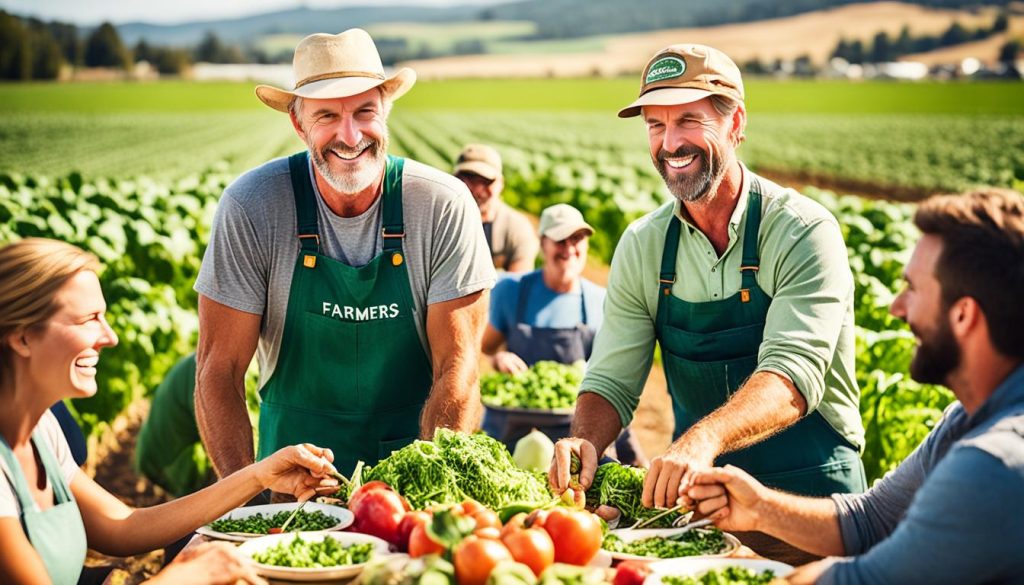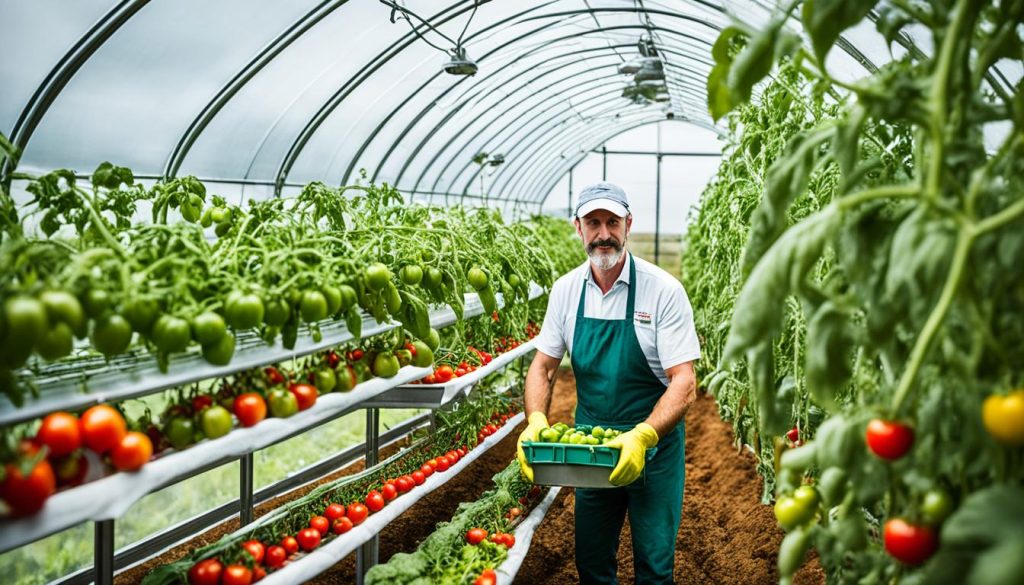Welcome to our deep dive into sustainable Spanish agri-businesses in the UK! The demand for sustainable products is rising fast. It’s key to see the new ways and efforts in the Spanish farming world. This piece looks at how these businesses are affecting the UK market, their dedication to being green, and working with local groups.
Key Takeaways:
- Sustainable Spanish agri-businesses are making a big mark in the UK market.
- These companies focus on green innovations and sustainable farming.
- Working with UK sustainable food projects helps local areas.
- Getting organic certification and labels is crucial for real sustainable Spanish goods.
- Helping local farmers and communities is a main goal for these agri-businesses.
The Rise of Sustainable Agriculture
Sustainable agriculture has become a key global movement. It’s all about tackling climate change, saving biodiversity, and ensuring we have enough food. Companies in agriculture are now using sustainable ways to lessen their environmental impact and stay in business for the long haul.
Spanish agri-businesses are leading this change. They’re using new techniques and tech to support sustainable farming. They know it’s important to grow their businesses without harming the planet. This makes them a big part of the sustainable agriculture scene.
The main aim of sustainable farming is to cut down on synthetic inputs like pesticides and fertilizers. These can harm both the environment and our health. Instead, farmers focus on organic and natural methods. They care for the soil, grow a variety of crops, and use natural ways to control pests.
By looking after the soil, farmers boost nutrient cycling and water retention. This leads to better crops and less need for outside help. These methods are good for the planet and make the food healthier for us.
Sustainable farming is also about using resources wisely. Spanish agri-businesses use tech and data to make the most of what they have and waste less. They have smart irrigation and crop monitoring systems. These help them use resources better and lessen their environmental impact.
The Benefits of Sustainable Agriculture
Switching to sustainable farming has many upsides for the environment and the farming world. It helps fight climate change by storing carbon in the soil. It also helps protect biodiversity by giving homes to helpful insects and animals.
Also, sustainable farming makes farms more resilient against climate issues like extreme weather and changing rainfall. By growing different crops and using smart farming, Spanish agri-businesses can keep producing food even when the weather is tough.
Leading the Way: Spanish Agri-Businesses
Spanish agri-businesses are setting a high standard for sustainable farming. They’re using new methods that focus on the planet while still giving people the quality food they want. Whether it’s small organic farms or big companies, they see sustainable farming as the way to go for their future.
Next, we’ll look closer at what Spanish agri-businesses in the UK are doing for sustainability. We’ll see their green innovations, work with local food projects, efforts to save biodiversity, and support for local farmers and communities.
With sustainable farming leading the way, Spanish agri-businesses are helping shape a greener, more resilient future for farming.
Spanish Agri-Businesses in the UK Market
Spanish agri-businesses have made a big mark in the UK market. They offer a wide range of top-quality products. These products meet the growing need for sustainable and ethically sourced food. They work closely with UK retailers, wholesalers, and consumers, showing their dedication to great produce and eco-friendly practices.
Greenleaf Organics is a great example of this. They focus on organic vegetables and fruits. Their sustainable farming has helped them enter the UK market. They supply big supermarkets and small shops with fresh, pesticide-free produce.
Here are some key stats on Spanish agri-businesses in the UK:
Table: Spanish Agri-Businesses’ Contribution to the UK Market
| Market Segment | Percentage Share |
|---|---|
| Fresh fruits and vegetables | 15% |
| Wine and spirits | 12% |
| Olive oil | 8% |
| Canned and preserved foods | 6% |
These numbers show how big a role Spanish agri-businesses play in the UK market. They supply essential agricultural products. Products like citrus fruits, tomatoes, olives, and wine are popular with British consumers.
Spanish agri-businesses succeed because they mix traditional farming with modern sustainability. They focus on organic farming, use less water, and cut down on chemicals. This way, they meet UK consumers’ high standards and their concerns about the environment and health.
This image shows the wide range of Spanish produce in the UK. From colorful fruits and veggies to the rich taste of olive oil and wine, Spanish agri-businesses have brought their authentic products to British consumers. This has added to the UK’s food diversity and sustainability.
Next, we’ll look at the eco-friendly practices of Spanish agri-businesses. These practices have made them leaders in sustainability.
Eco-Friendly Innovations in Spanish Agri-Businesses

Spanish agri-businesses lead in using eco-friendly innovations for sustainable farming and less environmental harm. These changes happen at all stages of farming, showing the industry’s dedication to the planet and its resources.
Achieving Sustainable Production
Precision agriculture is a key innovation. Spanish farmers use satellite imagery, weather sensors, and machine learning algorithms for better farming. This helps them use fertilizers, water, and pesticides wisely, cutting waste and their environmental impact.
Promoting Natural Pest Control
They also prefer biological pest control over chemicals. By using integrated pest management, they keep pests under control with natural methods. This protects the environment and helps nature thrive.
Maximizing Energy Efficiency
Efficient use of energy is a big goal. They use renewable energy like solar and wind to power farms and cut down on fossil fuel use. Also, smart irrigation systems with smart sensors and automated controls save water and energy.
Implementing Circular Economy Practices
They’re also following the circular economy by using farm waste in new ways. Anaerobic digestion turns organic waste into biogas for energy. The leftover, called digestate, is a natural fertilizer, reducing the need for synthetic ones.
Enhancing Soil Health
Regenerative agriculture is another big step forward. Practices like cover cropping and crop rotation build up soil, improve its health, and hold more water. This approach boosts biodiversity, fights climate change, and makes farming more sustainable.
| Innovation | Benefits |
|---|---|
| Precision Agriculture | Optimized use of resources, reduced waste |
| Biological Pest Control | Environmentally friendly, biodiversity conservation |
| Renewable Energy | Reduced carbon footprint, sustainable energy source |
| Circular Economy | Waste reduction, resource efficiency |
| Regenerative Agriculture | Improved soil health, climate change mitigation |
Sustainable Farming Practices in Spanish Agri-Businesses
Spanish agri-businesses are leading the way in sustainable farming. They focus on taking care of the environment and farming responsibly. These efforts help produce food that is both high quality and ethically sourced.
1. Organic Farming
More and more, Spanish agri-businesses are choosing organic farming. This method focuses on keeping soil healthy and supporting many different plants and animals. It also means not using harmful chemicals, which is good for the planet and for people’s health.
2. Conservation of Resources
Spanish agri-businesses are all about using resources wisely. They use smart irrigation systems to save water and grow plants better. They also use solar power to cut down on harmful emissions and rely less on energy that can’t be replaced.
3. Ethical Treatment of Animals
Looking after animals is key to sustainable farming. Spanish agri-businesses make sure animals live well and are treated kindly. They use methods like free-range farming to let animals act naturally, which makes their products better for everyone.
4. Crop Rotation and Biodiversity
Crop rotation is a big part of farming in Spain. It stops soil from getting worn out and keeps pests away. By changing what they grow and adding different plants, farmers help the soil and support many kinds of life on their farms.
5. Sustainable Waste Management
Spanish agri-businesses are working hard to reduce waste and protect the environment. They compost, use farm waste as animal feed, and choose packaging that’s better for the planet. These actions help create a more circular economy and lessen the farm’s impact on the environment.
| Farming Practice | Key Benefits |
|---|---|
| Organic farming |
|
| Conservation of resources |
|
| Ethical treatment of animals |
|
| Crop rotation and biodiversity |
|
| Sustainable waste management |
|
Promoting Biodiversity and Conservation
Spanish agribusinesses are key in promoting biodiversity and conservation. They know how vital ecological balance is. So, they use sustainable practices to protect habitats and save native species.
They focus on sustainable agriculture. This means they use methods that don’t harm the environment and help biodiversity. By not using harmful pesticides and fertilizers, they keep ecosystems healthy. This helps plants and animals thrive.
Spanish agribusinesses also work to save endangered species. They join breeding programs, conservatories, and wildlife sanctuaries. This helps bring back threatened species to their homes. It’s a big step for biodiversity on a global scale.
Promoting Ecological Balance
They don’t just save species; they also keep ecosystems balanced. By using sustainable farming, like crop rotation and pest management, they cut down on harmful chemicals. This helps nature stay in balance.
They also help protect natural habitats. Working with environmental groups, they save and improve places like wetlands, forests, and grasslands. This lets native species flourish and helps with biodiversity.
Partnerships and Collaborations
Spanish agribusinesses know the value of working with experts and local communities. Through partnerships, they share knowledge and come up with new ways to protect nature.
These partnerships aren’t just within Spain. They join global efforts to save biodiversity. By sharing ideas and working together, they help protect our planet’s natural treasures.
Leveraging Technology for Sustainability
Technology is key in today’s fast world for making sustainable practices work. Spanish agri-businesses use tech to make their operations more sustainable. They use new solutions to cut down on environmental harm, boost productivity, and work more efficiently.
Precision Agriculture
Spanish agri-businesses are big on precision agriculture. They use advanced sensors, drones, and GPS to check on crops, manage water, and apply fertilizers just where they’re needed. This approach cuts down on waste, lowers chemical use, and makes sure crops get exactly what they need to grow well.
Smart Irrigation Systems
Water is a precious resource, and Spanish agri-businesses know it. They’re fighting water scarcity with smart irrigation systems. These systems use real-time data and weather forecasts to save water. They deliver water right to the roots of plants, saving water and keeping crops healthy.
Advanced Monitoring Techniques
Technology lets Spanish agri-businesses keep a close eye on their work. With sensors and data analytics, farmers can track soil quality, crop health, weather, and pests. This real-time info helps them act fast, spot problems early, and make smart choices. It cuts down on waste and makes crops stronger.
Putting technology together with sustainable farming is a winning combo. It helps Spanish agri-businesses use resources better, waste less, and work towards a greener future.
| Benefits of Technology in Spanish Agri-Businesses |
|---|
| Enhanced resource management |
| Reduction in chemical usage |
| Improved crop yields |
| Efficient water management |
| Early pest detection |
Collaborations with UK Sustainable Food Initiatives
Spanish agri-businesses are now focusing on sustainable practices. They work with UK sustainable food projects. These partnerships help the environment and support UK communities.
Promoting Local Sourcing and Fair Trade
These partnerships are key in promoting local sourcing and fair trade. Spanish agri-businesses work with UK projects to bring products to market ethically. This helps local farmers and workers and keeps the supply chain sustainable.
Sharing Best Practices and Innovation
Spanish agri-businesses and UK projects share best practices and innovate together. They exchange knowledge and work on joint projects. This keeps them leading in sustainable farming and green tech.
Market Expansion and Consumer Education
These partnerships also help Spanish agri-businesses grow in the UK market. They educate consumers on sustainable practices. This creates a bigger market for sustainable Spanish products and encourages eco-friendly choices.
Examples of Collaborations with UK Sustainable Food Initiatives
| Collaboration | Description |
|---|---|
| The Green Partnership | A joint initiative promoting sustainable farming practices, reducing food waste, and promoting biodiversity in the UK. |
| Fair Trade Alliance | A collaboration aimed at supporting fair trade principles and ensuring equitable working conditions for farmers and workers. |
| Green Grocers Network | A network connecting Spanish agri-businesses with local grocers committed to stocking and promoting sustainable produce. |
These collaborations show Spanish agri-businesses’ commitment to sustainability. They work with UK projects for a greener, more responsible food system.
Organic Certification and Labeling
In the world of sustainable farming, organic certification and labeling are key. They keep things transparent and ensure Spanish farms are honest. Getting organic certified is hard work. It means farms follow strict rules to protect the environment and keep people healthy.
Organic certification means farms don’t use harmful chemicals like pesticides or GMOs. It shows they care for the soil, water, and all living things. This is good for the planet.
For shoppers, clear labels help them choose better. They can pick products that are good for the earth and their health. Spanish farms know how important labels are. They use them to show they care about organic farming and are open with customers.
The Benefits of Organic Certification
Getting organic certified has many perks for Spanish farms:
- It opens up new markets for them. People want to buy organic, so farms can sell more.
- Organic products usually sell for more money. This is because they meet high standards and are rare. Spanish farms can make more money by being organic.
- It’s good for the planet. Organic farming doesn’t use harmful chemicals, so it protects nature.
- It makes farms look good. Being organic builds trust with customers and sets them apart from others.
The Importance of Clear Labeling
Good labels make things clear for shoppers. They help people choose products that match their values. Spanish farms know labels are key. They use them to share important info like the organic logo, where it’s from, and how it was made:
- The organic logo means the product is really organic. It’s a sign of trust and honesty.
- Telling people where it’s from helps them support local farms. It’s good for the community.
- Sharing how farms work shows their commitment to the planet. It talks about things like taking care of the soil and saving water.
By going for organic certification and clear labels, Spanish farms show they’re serious about sustainable farming. They’re helping people and the planet. Next, we’ll see how these farms work with local farmers and communities for a better food system.
Supporting Local Farmers and Communities

Spanish agri-businesses focus on sustainable practices and help local farmers and communities grow. They start projects that help the local economy and make people feel part of something bigger.
They work directly with farmers to make sure they get fair prices for their crops. This creates a stable income for farmers and a strong supply chain. It’s good for everyone involved.
These businesses also run workshops and training for farmers. They teach better farming methods and sustainable practices. This helps farmers work smarter and protect the environment.
Promoting Community Well-being
Spanish agri-businesses also work with the local community to make life better. They host events that bring people together, building a strong community feeling.
They support things like farmers’ markets and community gardens. These places let farmers sell directly to people, helping them make a living. They also bring people and farmers closer, building trust and support.
Economic Growth and Sustainability
Helping local farmers and communities, Spanish agri-businesses boost the economy. They invest in local skills and jobs, making the area more active.
Supporting local farmers keeps old farming ways alive and protects nature. It’s key for growing food in a way that’s good for the planet. This means people can enjoy fresh, healthy food from their area.
In short, Spanish agri-businesses are key to helping farmers and communities. Their work on partnerships, sharing knowledge, and community projects leads to growth, well-being, and a green future.
Sustainable Packaging and Distribution Methods
In today’s world, it’s vital for Spanish agri-businesses in the UK to focus on sustainable packaging and distribution. They aim to lessen their environmental impact by using eco-friendly practices from start to finish.
Spanish agri-businesses are leading the way in sustainable packaging. They’re choosing materials that break down easily, can be composted, or are recycled. This helps cut down on waste and the gases that come from packaging.
They’re also working on making their distribution more sustainable. This means planning their routes better, cutting down on how far they travel, and using vehicles that are good for the planet. This helps lower their carbon footprint and the harm they do to the environment.
Another way they’re making things better is with smart packaging technology. This lets them keep an eye on things like temperature and humidity while they’re being moved. It keeps products fresh, cuts down on waste, and makes better use of resources.
Case Study: EcoBox
EcoBox is a top Spanish agri-business that shows how serious they are about sustainable packaging and distribution. They’ve come up with packaging that’s not just biodegradable but also really innovative. Their packaging uses materials that are good for the planet and has features that help keep products fresh longer, which means less food waste.
| Benefits of EcoBox’s Sustainable Packaging |
|---|
| Reduces plastic waste |
| Biodegradable and compostable |
| Extends product shelf life |
| Optimizes storage space |
| Appealing and informative design |
EcoBox also has a great way of getting their products to customers. They work with transport companies that use electric and hybrid vehicles. This big cut in carbon emissions makes their supply chain much greener.
By focusing on sustainable packaging and distribution, Spanish agri-businesses like EcoBox are cutting their environmental impact. They’re also meeting the UK’s demand for products that are good for the planet. These businesses are showing others in the industry how to move towards a more sustainable future.
Consumer and Market Demand for Sustainable Spanish Products
More people in the UK want sustainable Spanish products. This shows how much they care about the planet. Spanish agri-businesses are leading the way in offering these products.
People are looking for products that help the environment. They want to buy things that protect nature and cut down on pollution. This is why sustainable Spanish products are becoming more popular.
These products are loved for their quality and taste. Spanish agri-businesses focus on making sure their products are not just good for the planet but also delicious. This makes them a top choice for many.
There’s also a big push to support local and ethical businesses. People want to buy from companies that care about the planet and people. This is why sustainable Spanish products are in demand.
Because of this, Spanish agri-businesses are growing fast. More shops and restaurants are selling these products. This helps the businesses, the Spanish economy, and sustainable farming in Spain and the UK.
In summary, there’s a big demand for sustainable Spanish products in the UK. Eco-friendly consumers, great products, and a focus on sustainability have made Spanish agri-businesses leaders in the market. Now, consumers can choose to help the environment and support local communities by buying these products.
Overcoming Challenges and Future Outlook

Spanish agri-businesses in the UK are on a path towards sustainability. They face challenges but have a bright future ahead. It’s vital to tackle these challenges for growth and to improve sustainable farming.
Challenges
Adapting to the UK’s climate and conditions is a big challenge for Spanish agri-businesses. They need to understand the local soil, weather, and pests. They must also invest in new tech to manage resources better and reduce harm to the environment.
There’s a big push for organic and sustainable products from consumers. Spanish agri-businesses must meet these demands by following strict organic standards. They need to keep researching and finding new ways to be sustainable and keep product quality high.
Working with local farmers and communities is also key. This means working together on sustainability projects, setting fair prices, and sharing best practices. Building trust and working together can help overcome obstacles and make farming in the UK more sustainable.
Future Outlook
Despite challenges, the future looks good for Spanish agri-businesses in the UK. There’s a growing need for sustainable and local products. This offers them a chance to grow and help make the future greener.
Investing in research and development is crucial. Spanish agri-businesses can innovate with eco-friendly tech and farming methods. This includes using precision agriculture, vertical farming, and regenerative methods to be more productive and less harmful to the environment.
Using digital tech and data can also help. It can make operations more efficient, better manage resources, and improve decision-making. These tools can help Spanish agri-businesses tackle challenges and achieve sustainability goals.
Working together with industry, policymakers, and consumers is also important. By sharing knowledge and resources, and supporting policies, the agricultural sector can build a sustainable food system.
In conclusion, Spanish agri-businesses in the UK face hurdles on their sustainable journey. But with innovation, teamwork, and technology, they can beat these challenges. Their commitment to sustainability will benefit the environment and meet the demand for ethical food.
Conclusion (Do not write ‘Conclusion’)
Sustainable Spanish agri-businesses are making big strides in the UK market. They’re leading the way with eco-friendly farming and new tech. Their work is meeting the demand for green products and helping protect nature.
Working with UK sustainable food projects has boosted their impact. These partnerships focus on organic labels and supporting local farmers. This approach highlights the need for strong, diverse farming systems.
These businesses are also focusing on sustainable packaging and distribution. This appeals to shoppers who care about the planet. Their work is pushing for a better food industry.
The future looks bright for sustainable Spanish agri-businesses in the UK. They’re tackling challenges and finding new chances to grow. They’re key to making UK agriculture more sustainable and strong.
















